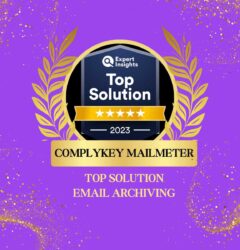

Data retention, also referred to as records retention, is the continuous preservation of an organization’s information for compliance or business purposes. The General Data Protection Regulation (GDPR) doesn’t dictate specific retention timelines. Instead, it highlights the principle that information should be stored only for as long as necessary. This principle, detailed in Article 5(1)(e) GDPR, underscores the significance of restricting storage to meet the initial objectives of data gathering. However, some exceptions permit longer retention periods, such as for public interest or research, provided necessary measures like anonymization or encryption are implemented. It’s the responsibility of organizations to comprehend their data, knowing what data they have, its purpose, and deciding whether to delete or anonymize it when it’s no longer needed.
Exploring Data Retention
Data retention involves safeguarding data for a fixed duration, driven by legal, regulatory, or business needs. This includes various types of data such as emails and electronic documents. An integral part of data management, retention ensures that relevant information is appropriately preserved. It aids in legal compliance, shields against litigation, and supports investigations.
Retaining Data ‘Just in Case’ it’s needed
Certain organizations hoard data unnecessarily, justifying it as a potential future use. However, this practice is not valid under GDPR. Adopting such a mindset could lead to the accumulation of irrelevant, excessive, or outdated data, which can infringe upon individuals’ rights and damage the organization’s reputation. Moreover, storing unnecessary data increases storage and security costs, impeding operational efficiency, especially when dealing with data access requests.
Types of Data Retention Policies
Business Retention: Customized to suit the organization’s needs, such as retaining customer data for marketing purposes, and employee records.
Legal Retention: Necessary for potential legal disputes or investigations, requiring the retention of relevant data.
Regulatory Retention: Mandated by law or industry regulations for example, healthcare and financial institutions.
Key Components of a Policy
- Addressing Security and Privacy
- Setting Retention Periods and Disposal Criteria
- Identifying Data Types and Sources
- Implementing Monitoring and Compliance Audits
- Choosing Technology and Storage Solutions
Importance of Data Retention
Data retention is vital for compliance, disaster recovery, and business continuity. Non-compliance can result in hefty penalties, while a well-structured policy can help manage risks and ensure smooth operations during crises.
Data retention is a complex aspect of data management, requiring meticulous planning and adherence to legal and business requirements. By setting up detailed policies and procedures, organizations can effectively manage data, ensuring compliance and operational resilience.
Data privacy and regulatory compliance are essential components of running a business. Organizations must follow laws and industry standards to ensure data security, privacy, and ethical data handling. Deciphering the intricacies of compliance can be daunting. ComplyKEY will make the process easier. ComplyKEY Content includes two modules, MailMeter and SISCIN. Both these modules can be used standalone and combined with ComplyKEY Control


